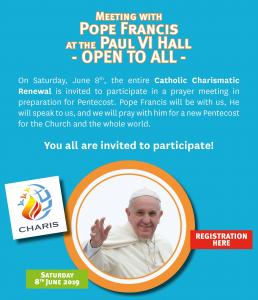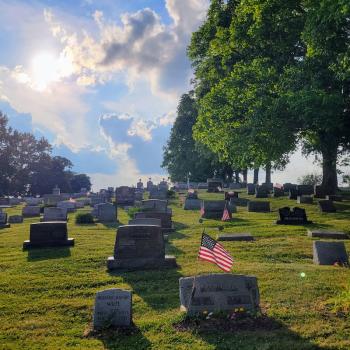The Vatican Speaks on the Promise and Perils of the Charismatic Renewal
When Pope Francis spoke to those assembled in the Circus Maximus for the Golden Jubilee of the Catholic Charismatic Renewal, he emphasized three essential and intertwined attributes of the movement: Baptism in the Holy Spirit, praise, and social action.

Regarding Baptism in the Holy Spirit (a notoriously slippery concept to pin down), Pope Francis called it “A flood of grace of the Spirit! Why a flood of grace? Because it has no founder, no bylaws, no structure of governance. Clearly it has given rise to many expressions that, surely, are human works inspired by the Spirit, with various charisms, and all at the service of the Church. But before this flood of grace one cannot erect dikes, or put the Holy Spirit in a cage! … This flood of grace is for the whole Church, not just for some, and none of us is the “master” and the others servants. No. We are all servants of this flood of grace.” There is no “ordination” in the Third Way of Prayer—we are all equal servants of one master, with no hierarchy to impose order according to human standards. Attempts to corale this type of prayer and fellowship with rigid structures, autocratic leadership, or certain people gaining money or power by the use of their “charisms” all belie claims to be partakers in and servants of Baptism in the Spirit.
And just as we profess “One Baptism” among all Christian sects, so Pope Francis said the charismatic renewal “was born ecumenical! It was born ecumenical because it is the Holy Spirit who creates unity, and the same Spirit who granted the inspiration for this.” He also quoted a Lutheran in explaining that Pentecostal gathering seeks the peace of “reconciled diversity.” We cannot put the Holy Spirit in a cage of exclusionary doctrinal formulations any more than we can keep the Spirit from granting gifts without the permission or participation of the clergy.
Praise also may take diverse forms in this Third Way of Prayer, but it should be filled with exultation and joy, said Pope Francis. Like “David dances before the Ark of the Covenant, filled with exultation… And please, let us not fall into the attitude of Christians who have the ‘Michal complex’, ashamed of the way David chose to praise God.” No one says drums or guitars are required, but if we’re judging the style of worship of fellow Christians as “not dignified enough,” we are indeed committing the same error as Michal, and trying to erect dikes against the Spirit. It will only stop the flow of grace into our own souls; it will not stop those baptized in the Spirit from praising God as the Spirit moves them.
Finally, the Third Way of Prayer must bear fruit in social action. Pope Francis noted that early leaders of the Charismatic Renewal “state[d] clearly that the charismatic renewal is also service to society, to humanity.” He went on to say:
Baptism in the Holy Spirit, praise, social action. The three things are inseparably linked. I can give deep thanks, but if I do not help those in need, it is not enough. “There was not a needy person among them”, says the Book of Acts (4:34).
We will be judged, not on our praise but on what we have done for Jesus. “Lord, when did we do this to you? When you did it for one of these little ones, you did it to me” (cf. Mt 25:39-40).
Perhaps my friends who have encountered bitter fruits among “charismatics” were among people who only participated in charismatic-style praise, and tried to commandeer the gifts of the Holy Spirit for themselves, rather than offering the Spirit’s gifts back to the benefit of those in need?
If this Third Way of Prayer is indeed an intimate communal experience of intercourse not only between individuals and the Holy Spirit, but among multiple believers in the Spirit, then we must consider the need to be discriminating in who we bare our souls before. No one who invokes the name of the Spirit in order to assert authority over fellow believers deserves to be trusted as an authentic agent of the Spirit. A true lover offers the gift of self, and never forces his way upon another. The early Christians were constantly concerned with discerning false prophets from true ones, and learning the essentials of such discernment is the first prerequisite to entering into a fruitful communal prayer fellowship.
Discernment of authentic movement of the Holy Spirit becomes all the more urgent when fellowship extends beyond prayer and occasional gatherings into a communal way of life. Likely the need to protect the intimate communion of believers from corrupting participants is why “receive the Holy Spirit” is followed immediately by “If you forgive the sins of any, they are forgiven them; if you retain the sins of any, they are retained.” (Jn 20:22-23) The liars Ananias and Sapphira were even struck dead by God in Acts 5, sending a clear zero-tolerance message to the early Christian community about “faking it.” Accordingly, CHARIS is chartered to register and help form charismatic groups that are not merely “fellowships,” but communities that live a community life, sustaining one another. There is much greater need for Vatican involvement in these communities than for simple prayer groups.
Pope Francis’s speech alluded to concerns that the Charismatic Renewal may have in certain respects lost its way over the last 50 years, and itself needs renewal and reform.
Fifty years have gone by. At this age, our strength begins to decline. It is the halfway point of life – in my country, we call it el cincuentazo –, when our wrinkles get deeper. Even if you cover them up, they are still there! Grey hairs start to show and we begin to forget things…. Fifty years is a good time in life to stop and reflect… And I would add this: it is the time to press forward with greater strength, leaving behind the accumulated dust of time, giving thanks for what we have received and looking ahead to new things, with trust in the working of the Holy Spirit!
…
Dear brothers and sisters, my wish for you is that this will be a time of reflection, a time for remembering your origins. A time too, to leave behind everything motivated by self-concern. May it become a desire instead to listen to, and joyfully accept, the working of the Holy Spirit, who blows where and how he wills!
Likewise, Fr. Cantalamessa’s second monthly message for CHARIS is focused on conversion. He calls on the charismatic renewal to “turn and become like children” (Mt 18:4) and look to the example of the first call of the apostles, when they were “unpretentious, without titles, without comparisons among them, without envy, without rivalry. Rich only in a promise (‘I will make you fishermen of men’) and of a presence, Jesus’s own. Return to the time when they were still companions of adventure, not competitors for the first place. For us too, going back to being children means returning to the moment when we first made a personal experience of the Holy Spirit and discovered what it means to live in the lordship of Christ. When we said: ‘Jesus is enough!’ And we believed it.” He also reflects on the movement’s slogan “returning power to God!” as being less a triumphant cry as a reminder “addressed to us who, perhaps without realizing it, have partially appropriated ourselves of the power that belongs to God.”
The Third Way of Prayer in Action
Before I came upon all this fresh material about the Vatican’s hopes and concerns for the charismatic renewal, I did some “field research.” What I found locally is an inspiring Third Way of Prayer kind of fellowship, not the kind of charismatic community that could run the risk of exercising cult-like power over its members. My only disappointment is that these prayer fellowships are only conducted in Spanish, at least anywhere within a 30-minute drive from where I live. Nevertheless, I think it helpful to share some observations that confirm the virtues of the Third Way of Prayer model.












